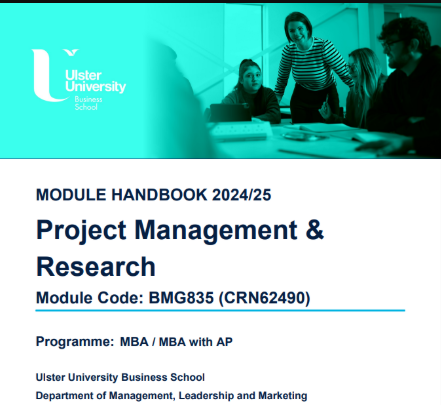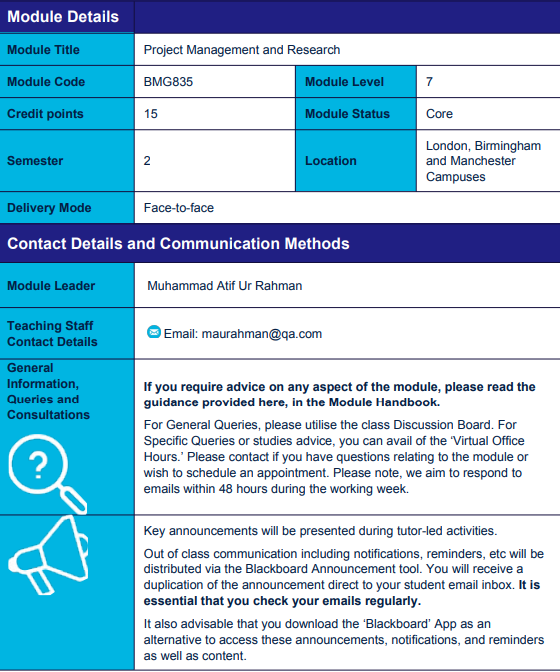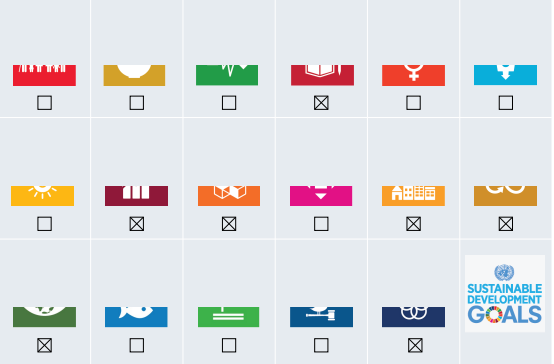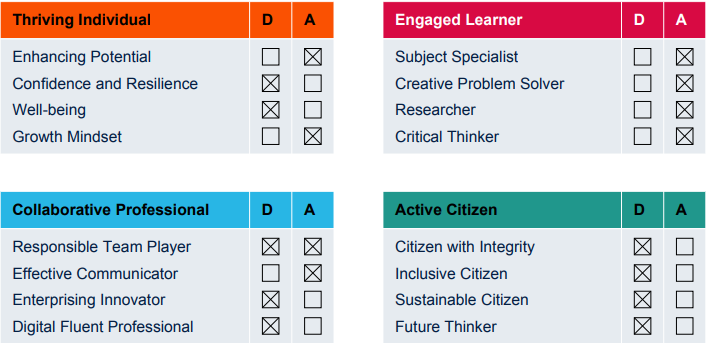| Category | Dissertation | Subject | Management |
|---|---|---|---|
| University | Ulster University | Module Title | BMG835 Project Management & Research |
| Word Count | 3000 Words |
|---|---|
| Assessment Title | Module Handbook |
| Academic Year | 2025-26 |

Welcome
1. Module Overview and Communication
2. Sustainable Development Goals (SDGs) and Graduate Attributes (GAs) in your module
3. Aim and Learning Outcomes
4. Assessment and Feedback
5. Learning Resources
6. Organisation and Management
7. Student Voice and Support Services

The UN SDGs are a comprehensive set of global goals to end poverty, protect our planet, and improve living conditions of the Global Population. You are encouraged to think critically and reflect on SDGs in the context of this module.
The following SDGs are relevant in the context of this module:


Ulster University’s Graduate Attributes are a high-level set of competencies, developing universal understandings, skills, qualities, and values.
As a result of engaging with this module, you will have opportunities to develop and practise the following selected attributes:

Project management is the practice of initiating, planning, executing and closing the work of a team to meet specific goals/success criteria at the specified time. The objective of project management is to produce a complete project that complies with the organisation or client's objectives. This module will provide students with the primary knowledge necessary to prepare a research project.
It is essential that students of management are aware of the breadth of possible research approaches to provide consumers or users of research with rigorous, valid and reliable outputs. The ability to manage such projects with limited resources and yet deliver and implement effective solutions is important in today's business world.
The aims of this module are: to develop an understanding of how to successfully manage a project; to be able to select, use and analyse the findings from a range of research methods; and apply this learning to managing a research project on an organisational issue.
What should you be able to do by the end of this module?
Successful participants will be able to:
1 Understand the purpose and content of project management: roles, principles, themes, processes and major management products.
2 Analyse a current business and management issue and formulate a suitable and practical research plan.
3 Apply and tailor project management principles within the context to develop a project plan.
4 Evaluate each step of the project plan, justifying the decisions taken to guide the project throughout its lifecycle.
What do you need to do to demonstrate the achievement of learning?
This Module Will be Assessed Via One item of Assessment
| Type / Element |
Assessment method Submission date, time and submission method |
Percentage (%) and word count equivalent |
Feedback due date |
|
Element 1 Coursework 1 Final Report |
DATE and Time: Check the BB module page Submit via Blackboard |
100% 3000 words |
TBC (via Blackboard Ultra) |
1) Word count includes the title page, contents page, in-text references and citations but excludes tables, reference list and appendices.
2) Your work should include references to relevant journal articles and other good-quality information sources and should be properly laid out using the Harvard system of referencing. More detailed guidance is available in the Subject Guides. We encourage you to make good use of all the support services offered by your Campus Librarian; further details are in the Learning Support Services Section.
3) You should refer to the assessment criteria to provide fuller details of the marking criteria for each classification band.
4) In addition, you should refer to the standard assessment guidelines as presented in your Course Handbook/Support Area, which includes guidance and policies on referencing style, plagiarism, etc.
5) We recommend the use of Studiosity, which offers constructive feedback on draft written submissions within 24 hrs.
6) Coursework must be submitted by the dates specified. Coursework submitted after the deadline, without prior approval, is not normally accepted. For further guidance on the late submission of coursework, please see the course handbook.
7) Assessments must be submitted as per the assessment brief.
Please note: Words in excess of +10% of the word count will not be marked.
Written Assignment
Students are required to produce a project plan for a research project for a case organisation. The project plan should include:
The project plan should be supported by a reflective statement on the process of producing the project proposal and justification of the plan, including the research methodology. The final report should be 3000 words.
As a guide, your written assignment should contain the following:
Aims and Objectives
Your aims stem from what you hope to achieve through undertaking the project. You should be able to give a full outline of the project and context of the project (i.e. environment and stakeholders). You should formulate your overall expectations and aspirations. Objectives should be more specific (SMART) and set out how you hope to achieve your overall aim.
Planned Research Methodologies
Articulate your planned research methodologies, clearly identifying how these will lead to credible answers to the questions posed. State exactly how the methods you have chosen will fulfil your project objectives. Under this heading, you should explain and justify your approach, e.g. qualitative, quantitative, mixed-methods, how you will find respondents (including articulation of population and sampling procedures), the data collection method (s) you intend to use, e.g. surveys, interviews, focus groups etc., and methods of analysis, giving reasons for your chosen method(s). Attention should also be paid to issues of ‘validity’ and ‘reliability’.
Project Schedule
This section includes the development of a realistic schedule within set timescales and a Gantt Chart. Your schedule should be realistic and conform to any overarching time frames or deadlines. You should be very specific with respect to dates and are advised to follow the suggested progression dates for key sections of your work. You are to develop a Gantt chart to monitor your progress and set personal deadlines (see Saunders et al., 2019, p.57 for an example). You should factor in time for contingencies and project time delays.
Risk Assessment
In this section, you should identify and assess realistic risks that can affect the project and how those risks have to be managed. A risk mitigation strategy is to be planned to effectively deal with the possible/potential risks related to the project.
Need plagiarism-free Answers for your college/ university BMG835 Dissertations
Order Non-Plagiarized Dissertation|
|
0-49 Fail | 50-59 Good | 60-69 Very Good | 70-84 Excellent | 85-100 Outstanding |
| Aim and objectives, full outline of project and context of project (i.e., environment and stakeholders) (20% | Insufficient level of competence in presenting the purpose of the project. Lacks knowledge and synthesis the aim and objectives of the project. Poor outline of the project that does not set the context | Good level of competence in presenting the purpose of the project. Good knowledge and synthesis of the aim and objectives of the project. Good outline of the project that sets the context in a coherent way. | Very good level of competence in presenting the purpose of the project. Very good knowledge and synthesis of the aim and objectives of the project. A clear outline of the project that sets the context in a clear way | Excellent level of competence in presenting the purpose of the project. Excellent knowledge and insightful synthesis of the aim and objectives of the project. A very clear outline of the project that sets the context in a very clear way | Exceptional level of competence in presenting the purpose of the project. Exceptional knowledge and insightful synthesis of the aim and objectives of the project. Robust outline of the project that outstandingly sets the context. |
| Planned research methodologies (30%) | Insufficient level of knowledge of research methodologies | Good level of knowledge of research methodologies | Very good knowledge of research methodologies | Excellent knowledge and some synthesis of research methodologies | Exceptional knowledge and insightful synthesis of research methodologies |
| Project schedule (20%) |
Insufficient skills in the development of a schedule within set timescales. Poor or missing Gantt chart. |
Good skills in the development of a schedule within set timescales, including a good Gantt chart | Very good skills in the development of a realistic schedule within set timescales, including a very good Gantt chart | Excellent skills in the development of a realistic schedule within set timescales, including an excellent Gantt chart., | Exceptional skills in the development of a realistic schedule within set timescales, including an exceptional Gantt chart. |
| Risk assessment (20%) | Risks missed and/or poor management. | Realistic risks identified and acceptable management. | Realistic risks are identified and well managed. | Thorough and realistic risks were identified and exceptionally well managed. | Thorough and realistic risks were identified and exceptionally well managed. |
| Writing, grammar, and referencing (10%) |
Poor and inadequate presentation, structure, grammar, spelling, and lacks Harvard referencing |
Good presentation, structure, grammar, spelling, and Harvard referencing | Very good presentation, structure, grammar, spelling, and Harvard referencing | Excellent presentation, structure, grammar, spelling, and Harvard referencing | Outstanding presentation, structure, grammar, spelling and Harvard referencing |
A list of current learning resources specifically chosen to build your knowledge and understanding for this module
Books/Journal Article/Publications Required Reading (Must read)
1. Bell, E., Bryman, A. and Harley, B. (2022). Business research methods. 6th ed. Oxford: Oxford University Press.
2. Larson, E.W. and Grey, C.F. (2020). Project management: the managerial process. 8th ed., International student edition. ed. New York, NY: McGraw-Hill Education
3. Pinto, J.K. (2020). Project management: achieving competitive advantage. 5th ed. Harlow, England: Pearson.
4. Saunders, M., Lewis, P. and Thornhill, A. (2019), ‘Research Methods for Business Students’, 8th Edition, Harlow, Pearson Education Limited
Books/Journal Article/Publications Recommended Reading (Should read/Could read)
Association for Project Management (2020) APM body of knowledge. 7th ed. Princes Risborough, Buckinghamshire: Association for Project Management.
Bell, J. (2010). Doing Your Research Project: A Guide for First-Time Researchers in Education and Social Science. 3rd ed. Maidenhead: McGraw-Hill Open University Press.
Easterby-Smith, M., Thorpe, R. and Lowe, A. (2008) Management Research: An Introduction. 3rd edition. London: Sage.
Gill, J. and Johnson, P. (2010) Research Methods for Managers. 4th ed. London: Sage.
Hinde, D. (2018) PRINCE2 Study Guide: 2017 Update. Newark: John Wiley & Sons, Incorporated.
Jankowicz, A. D. (2005). Business Research Projects (4th ed.), Thomson
Kumar, R. (2011). Research Methodology: A Step-by-step Guide for Beginners. 3rd ed. London: Sage.
Lind, D.A., Marchal, W.G. and Wathen, S.A. (2008). Basic statistics for business and economics. 6th ed. New York: McGraw-Hill.
Meredith, J.R., Shafer, S.M. and Mantel, S.J. (2022). Project management: a strategic managerial approach. Hoboken: John Wiley & Sons, Inc.
Yin, R.K. (2010). Case study research: design and methods. 4th ed. London: Sage.
Yin, R.K. (2012). Applications of Case Study Research. 3rd ed. London: Sage.
In collaboration with teaching staff, your Campus Librarian will be delivering timetabled workshops to ensure you can make the best use of the Library’s services and information resources in completing your coursework. Furthermore, if you need specific help with an assignment or dissertation, then you can make an appointment to meet with your Subject Librarian by email, phone or through the appointments schedule.
Online support is also available by accessing the Library’s Guides as these provide help in developing your information and research skills by identifying the best learning resources available, forming effective literature searches, offering academic writing support and adopting the best referencing techniques.
Types of learning activities that will make up your weekly timetable
BMG835 Project Management & Research is a 15-credit point module, which requires approximately 150 hours of your commitment, distributed through the following learning and teaching activities over the 15-week semester. For a description of the nature of the learning activities, please refer to your course handbook.
| Learning Activities: Week 1-12 | Total Hours (150 hours) |
| Lecture and Class Activities |
36 |
| Other, Directed Learning Activities |
114 |
The teaching and learning plan provides a more detailed overview of content every week.
Module delivery will typically consist of a three-hour lecture with seminar activities integrated, although format may vary slightly between weeks/sessions.
Seminars – please refer to the teaching and learning plan below for the seminar topic. Attendance at seminars is most important and therefore will be monitored. All students should download the SEAtS Student Attendance App to their smartphones. Regularly checking into class using the app helps you keep track of your attendance and ensures you stay on track with your studies. Please view the university attendance website for more information, including user guides, video demonstrations, and FAQs.
The teaching plan/order of weekly topics is subject to change. The list below provides an outline summary of weekly activities, and further information is available on BBL in the relevant week’s folder. Students will be expected to engage in all prescribed activities that contribute to the final assessment.
| Week/L&T Methods | Curriculum Content/Topic Title | Independent/Directed Study, includes: Required Reading, Seminar Preparation, and/or Assessment Preparation, and due dates |
| Week 1 Lecture |
Module Welcome: Introduction Module Introduction and Key Learning Outcomes Getting to know each other (Ice breaker activities)
|
Module Handbook
|
| Week 2 Lecture |
Organization Strategy & Project Selection
|
Project Screening Matrix Project Portfolio Matrix Project Proposal Form TOWS Matrix |
| Week/L&T Methods | Curriculum Content/Topic Title | Independent/Directed Study, includes: Required Reading, Seminar Preparation, and/or Assessment Preparation and due dates |
|
|
|
Project Management: The Managerial Process Book Chapter 2 |
| Week 2 Seminar | Group Task – TOWS Analysis (the case of NIKE) | Materials to be added to Blackboard |
| Week 3 Lecture |
The Organizational Context
|
McGraw-Hill Book Chapter 3 Work Breakdown Structure Responsibility Matrix |
| Week 3 Seminar | Project Brief – Stakeholder Mapping, Scope Statement | Group Task |
| Week/L&T Methods | Curriculum Content/Topic Title | Independent/Directed Study, includes: Required Reading, Seminar Preparation, and/or Assessment Preparation, and due dates |
| Week 4 Lecture |
Project Team Building, Conflict, and Negotiation
|
Pinto (2020) Book Chapter 6 |
| Week 4 Seminar | Teambuilding – Group Task | Conflict/Negotiation Scenario Roleplay |
| Week 5 Lecture |
Research Methodologies
Quantitative research methods - Reviewing and utilising existing organisational information, when to survey, and how to develop effective questionnaires |
Saunders, Lewis & Thornhill (2019) Ch 5, 6, 7, 8, 11 & 12 |
| Week 5 Seminar | Designing a Survey | Individual Assignment |
| Week/L&T Methods | Curriculum Content/Topic Title | Independent/Directed Study, includes: Required Reading, Seminar Preparation, and/or Assessment Preparation, and due dates |
| Week 6 | CLASS Presentations |
|
| Week 7 Lecture |
Risk Analysis, Risk Management, Risk Mitigation Plan
|
Pinto (2020) Book Chapter 7 QUALITATIVE RISK ASSESSMENT MATRIX for a given scenario |
| Week 8 Lecture |
Project Planning & Scheduling
|
Pinto (2020) Book Chapter 8 |
| Week 8 Seminar | Using MS Excel to construct a Gantt chart for a project scenario – Individual Tasks |
|
| Week 9 Lecture | Research Methodologies | Saunders, Lewis & Thornhill (2019) Ch 5, 6, 7, 8, 11 & 12 |
| Week/L&T Methods | Curriculum Content/Topic Title | Independent/Directed Study, includes: Required Reading, Seminar Preparation, and/or Assessment Preparation and due dates |
|
|
Qualitative research methods - including case studies, interviews, focus groups and participant observation |
|
| Week 9 Seminar | Interview Techniques: Roleplay | Group Work |
| Week 10 Lecture |
Data Analysis Presentation of results, making recommendations and drawing conclusions, and linking findings to existing research. |
Saunders, Lewis & Thornhill (2019) Ch 5, 6, 7, 8, 11 & 12 |
| Week 10 Seminar | Preparing Results in Excel | Individual Task |
| Week 11 Lecture |
Project Closeout and Evaluation
|
Pinto (2020) Chapter 14 Other readings will be added to the BBL folder for these sessions |
| Week/L&T Methods | Curriculum Content/Topic Title | Independent/Directed Study, includes: Required Reading, Seminar Preparation, and/or Assessment Preparation, and due dates |
|
|
How to critically analyse, synthesise, interpret, and evaluate data and information in a business management context. |
|
| Week 12 Lecture |
Module Review to Date & Framework for Final Report
|
|
| Week 12 Seminar | Q&A + Discussion of Final Assessment |
|
| DEADLINE DATE | ASSESSMENT SUBMISSION DUE – 6th May 2025 | |
As a course team, we incorporate the key partnership principles set out in the joint UU & Ulster University Students’ Union Student Voice Guidelines and proactively engage with the democratic election of UUSU academic student reps (Faculty Reps, School/Dept Reps & Course Reps) to ensure that student opinion is heard at Ulster. We respect your views and welcome your honest and constructive feedback on the module.
There are several ways to do this:
You can contact your Module Coordinator about any queries related to your learning experiences on the module as/when you have them.
You can voice your opinions through the formal Staff/Student Consultative Committee process by contacting one of the elected UUSU Course Reps in your class.
You will have the opportunity to give feedback on the module through completing the online Student Module Feedback Survey.
If you are experiencing difficulties that are impacting your studies, you can contact the Advice Bureau in the Students’ Union (UUSU). You can get advice and guidance on issues such as - complaints, appeals, housing problems, disciplinaries, and info on various support providers available. To have a chat with the team, contact UUSU online.
Ulster University’s Student Wellbeing team is available to help you manage common pressures many students experience while studying in higher education. Common pressures include stress, relationship issues, financial problems, and managing disability-related challenges, including mental health difficulties. There is no stigma to seeking support to maximise your wellbeing and achievement at UU.
Student Wellbeing support is free and confidential and is located on each of our campuses. Please view the Student Wellbeing pages for details on how to contact student wellbeing staff. Other external helplines are also available.
Ulster University’s Student Success team has developed a series of academic and study skills training resources and workshops to help you succeed educationally and develop personally and professionally. You can access these resources via the Student Success website or you can contact the team directly via email.
Hire Experts to solve this dissertation Before your Deadline
Buy Today Contact UsAre you looking for help with your BMG835 Project Management & Research? Don’t stress anymore! We offer expert Project Management assignment help at affordable prices. Our team of PhD writers provides well-researched, AI-free, and plagiarism-free work. We deliver before deadlines and are available 24/7 to support you. Whether it’s Business Management or any other topic, we’re here for you. You can also get free dissertation samples to check our quality. Improve your grades and reduce your stress—contact us today for reliable and professional assignment help that you can trust! We also provide Ulster University Assignment Samples that have been written by the phd expert writers. Contact us now!
Hire Assignment Helper Today!
Let's Book Your Work with Our Expert and Get High-Quality Content
